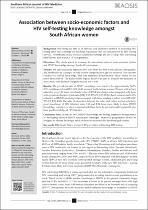| dc.contributor.author | Ekholuenetale, Michael | |
| dc.contributor.author | Nzoputam, Chimezie I. | |
| dc.contributor.author | Okonji, Osaretin C. | |
| dc.date.accessioned | 2022-07-11T09:38:23Z | |
| dc.date.available | 2022-07-11T09:38:23Z | |
| dc.date.issued | 2022 | |
| dc.identifier.citation | Ekholuenetale, M. et al. (2022). Association between socio-economic factors and HIV self-testing knowledge amongst South African women. Southern African Journal of HIV Medicine, 23(1), a1347. 10.4102/sajhivmed.v23i1.1347 | en_US |
| dc.identifier.issn | 2078-6751 | |
| dc.identifier.uri | 10.4102/sajhivmed.v23i1.1347 | |
| dc.identifier.uri | http://hdl.handle.net/10566/7577 | |
| dc.description.abstract | Self-testing for HIV is an effective and alternative method of increasing HIV testing rates and a strategy for reaching populations that are underserved by HIV testing services. Nonetheless, many resource-constrained settings are yet to adopt HIV self-testing (HIVST) into their national HIV programmes.his study aimed to examine the association between socio-economic factors andHIVST knowledge amongst South African women.We used nationally representative data from the 2016 South African Demographic and Health Survey. A sample of 8182 women of reproductive age was analysed. The outcome variable was HIVST knowledge. This was measured dichotomously; know versus do not know about HIVST. The multivariable logistic model was used to examine the measures of association, with the level of significance set at P < 0.05. | en_US |
| dc.language.iso | en | en_US |
| dc.publisher | AOSIS | en_US |
| dc.subject | HIV | en_US |
| dc.subject | Women | en_US |
| dc.subject | Self-testing | en_US |
| dc.subject | HIV testing | en_US |
| dc.subject | South Africa | en_US |
| dc.subject | Public health | en_US |
| dc.title | Association between socio-economic factors and HIV self-testing knowledge amongst South African women | en_US |
| dc.type | Article | en_US |

